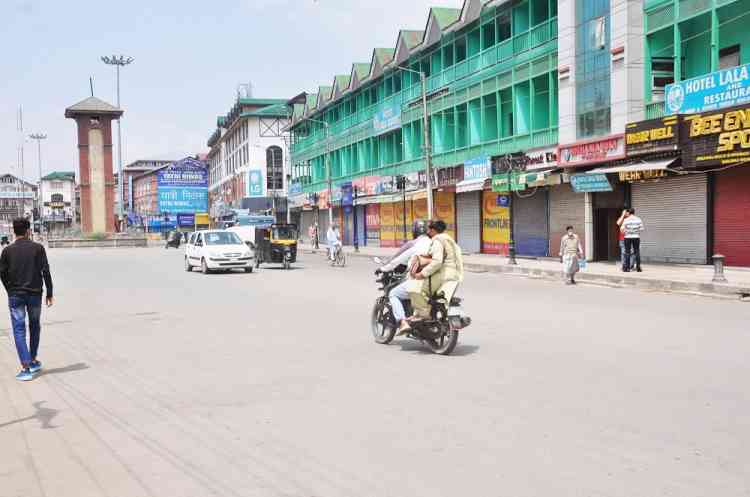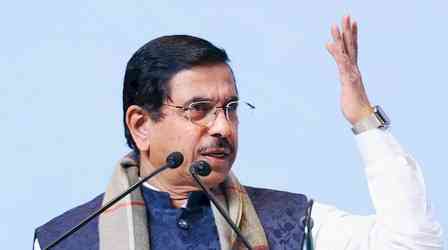Building 'Naya J&K': Governance improves; surveys, reports put UT on top
The year 2021 witnessed tremendous improvement in the governance standards of the Union Territory of Jammu and Kashmir. This fact has been acknowledged by different surveys that were conducted by various agencies last year.

New Delhi/Srinagar, Jan 4 (IANS) The year 2021 witnessed tremendous improvement in the governance standards of the Union Territory of Jammu and Kashmir. This fact has been acknowledged by different surveys that were conducted by various agencies last year.
A report prepared by The Food Safety and Standards Authority of India (FSSAI) released in September 2021 put J&K at the top among eight Union Territories in the country.
The Food Safety Index is based on five significant parameters -- human resources and institutional data, compliance, food testing (infrastructure and surveillance), training & capacity building and consumer empowerment.
J&K had scored 12 points in human resources and institutional data, 25 points in compliance, 12 in food testing (infrastructure and surveillance), five in training & capacity building, and 13 in consumer empowerment.
By scoring 67 points, J&K had secured the top positions among the UTs. J&K was third among large states/small states/UTs in India. Only Gujarat and Kerala with 72 and 70 points, respectively, were ahead in the rankings.
In its report, the Public Affairs Centre (PAC), a not-for-profit research think-tank, had adjudged J&K as the second best governed Union Territory in the country. The report released in November 2021 had stated that J&K has shown improvement in the composite ranking for governance index-2021 and bagged second position. In 2020, J&K had finished at sixth position among the UTs.
Based on government data, the Public Affairs Index (PAI) is a framework that measures the quality of governance at the sub-national level, and ranks the states and Union Territories on the basis of their performance in the sub-national governance for the overarching sustainable development pillars of equity, growth and sustainability.
The LEADS 2021 index, released by the Union Commerce Ministry, had also put J&K on top. The report had stated that within the northeastern states and Himalayan region, Jammu and Kashmir is the top ranker followed by Sikkim and Meghalaya.
According to the report, J&K and the northeastern states were considered as a separate category for ranking due to their geographical positioning, terrain, resource base and economic activity at large, which act as natural deterrents to development of a robust logistics infrastructure and its effective management. It had revealed that J&K leads the group on account of better than average performance in the operating and regulatory and objective indicators.
In the 39th NITI Aayog's Sustainable Development Goal (SDG) Urban Index 2021, Srinagar city secured 61.50 points. A total of 56 urban areas on 77 SDG indicators across 46 targets of the SDG framework were ranked by the NITI Aayog in collaboration with GIZ and BMZ under the umbrella of Indo-German Development Cooperation.
The ranking was done with regard to the performance in 14 SDG goals, which included no poverty, zero hunger, good health and well-being, quality education, gender equality, clean water and sanitation, affordable and clean energy, decent work and economic growth, industry, innovation and infrastructure, reduce inequalities, sustainable cities and communities, sustainable consumption and production, climate action, peace, justice and strong institutions. Out of the 14 SDG indicators, Srinagar was the top performer in six indicators, the front-runner in five and aspirant in three indicators.
In NITI Aayog's Health Index, which was released in the last week of December 2021, Jammu & Kashmir emerged as the leading performer in terms of incremental performance. Among the Union Territories, Delhi followed by Jammu & Kashmir had shown the best incremental performance.
In incremental performance, J&K was ranked at number two with a score of 9.55. In J&K, most of the indicators are in the improved/most improved/fully achieved category as far as the Incremental Performance from the Base Year (2018-19) to Reference Year (2019-20) was concerned.
According to the report, the health index comprises three domains -- health outcomes, governance and information, and key inputs and processes. In terms of overall health performance, the UT of J&K had moved one position up.
The latest report of National Family Healthy Survey (NFHS-5) stated that Jammu & Kashmir has shown a record improvement in the last three years in key maternal and child health indicators.
The report, while comparing the achievements in key health indicators recorded in National Family Healthy Survey report (NFHS-5) 2019-20 with the NFHS-4 of 2015-16, stated that J&K has recorded 22 points decrease in Neonatal Mortality Rate (NNMR) from 23.1 to 9.8, 16 points decrease in Infant Mortality Rate (IMR) from 32.4 to 16.3, and 19 points decrease in Under Five Mortality Rate (U5MR) from 37.6 to 18.5.
The report termed the developments as unprecedented and a reflection of the health status of the general population. It also indicated a positive change towards the girl child in J&K and recorded improvement in sex ratio at birth from 923 to 976 females per 1,000 males.
J&K's transition into UT boon for governance
Various reports released by different agencies in 2021 have driven home a point that J&K's transition from a state into a Union Territory has proven to be a boon for governance.
The common man of J&K has emerged as a winner. He couldn't become a part of India's development for the past 70 years due to the so-called special status enjoyed by the erstwhile princely state. The ones who are claiming that they will fight till their last breath for restoration of J&K's special status should tell the people what special status had given to a common man in J&K?
The benefits of centrally sponsored schemes didn't trickle down to the people, for whom these plans were meant for. But the ones who ruled J&K enjoyed all the privileges. More than anyone else, the political leaders were the biggest beneficiaries of J&K's special status. They are feeling the pinch as revocation of Article 370, a temporary provision of the Indian Constitution, has disempowered them. But the scrapping of the Article has empowered the common man of J&K.
Reports released by NITI Aayog and other agencies are ample proof of the fact that "where there is a will there's a way". The present dispensation in J&K is determined to take the Union Territory to new heights and the efforts of rulers are proving fruitful. Had the erstwhile regimes, including the three former chief ministers of J&K, shown the same will and resolve, J&K would have become a top performer long back.
But the politicians during their tenures remained focused on their chair and power. They kept on raising the issue of J&K's accession with India being temporary for decades due to which the concept of good governance took a back seat.
Now the time has changed and the Himalayan region is moving towards new heights. People of J&K too are supporting the moves of the government. 'Naya J&K' is emerging as a role model for the other states and Union Territories.


 IANS
IANS 










